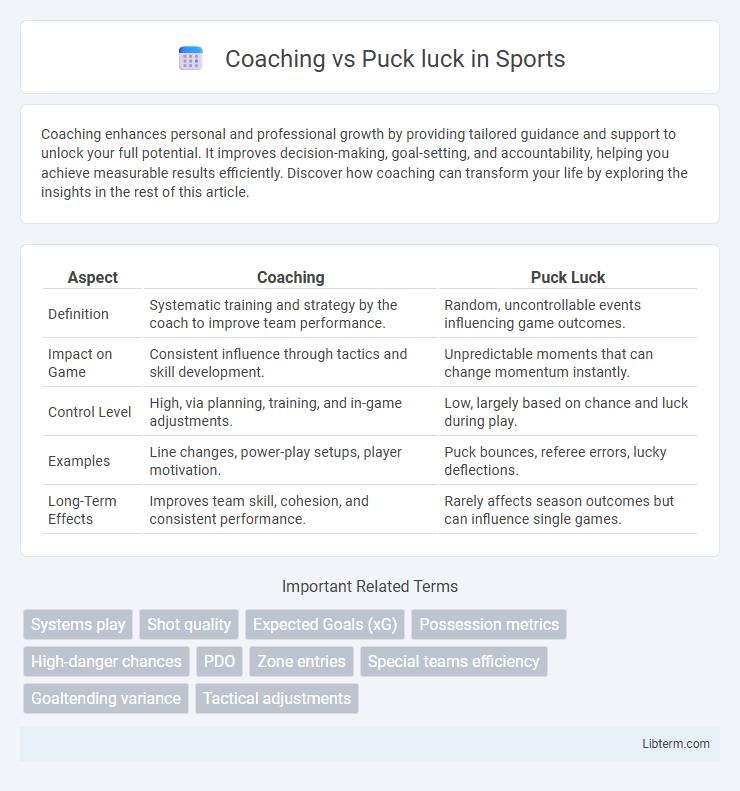Coaching enhances personal and professional growth by providing tailored guidance and support to unlock your full potential. It improves decision-making, goal-setting, and accountability, helping you achieve measurable results efficiently. Discover how coaching can transform your life by exploring the insights in the rest of this article.
Table of Comparison
| Aspect | Coaching | Puck Luck |
|---|---|---|
| Definition | Systematic training and strategy by the coach to improve team performance. | Random, uncontrollable events influencing game outcomes. |
| Impact on Game | Consistent influence through tactics and skill development. | Unpredictable moments that can change momentum instantly. |
| Control Level | High, via planning, training, and in-game adjustments. | Low, largely based on chance and luck during play. |
| Examples | Line changes, power-play setups, player motivation. | Puck bounces, referee errors, lucky deflections. |
| Long-Term Effects | Improves team skill, cohesion, and consistent performance. | Rarely affects season outcomes but can influence single games. |
Introduction: Defining Coaching and Puck Luck
Coaching involves strategic guidance, skill development, and motivation by a coach to enhance player and team performance through planned training and game management. Puck luck refers to the unpredictable and random events during a hockey game that can influence outcomes independently of skill or strategy, such as deflections, bounces, or referee calls. Understanding the balance between coaching and puck luck is essential for analyzing game results and improving team success.
The Role of Coaching in Team Success
Coaching plays a critical role in team success by developing strategic game plans, enhancing player skills, and fostering effective communication among team members. Unlike puck luck, which relies on chance events during gameplay, coaching provides consistent guidance and adjustments based on performance analysis and opponent tendencies. Effective coaching transforms individual talents into cohesive teamwork, significantly increasing the likelihood of sustained victories in competitive hockey.
Puck Luck: The Impact of Randomness in Hockey
Puck luck significantly influences game outcomes in hockey by introducing a layer of randomness that affects puck bounces, shot deflections, and goal-scoring chances. While coaching strategies provide structure and skill development, puck luck can unpredictably alter the flow and final results of matches. Statistical models indicate that controlling for puck luck reveals true player performance and team strength more accurately.
Strategies Coaches Use to Minimize Luck
Coaches employ advanced statistical analysis and data-driven decision-making to reduce the influence of puck luck in hockey, emphasizing skill development and strategic positioning. Using video review and situational drills, they prepare players to anticipate puck trajectories and improve reaction time, minimizing random outcomes. Implementing systems like zone defense and controlling puck possession increases team control, limiting the impact of unpredictable puck bounces on game results.
Statistical Evidence: Coaching vs. Puck Luck
Statistical evidence reveals coaching has a more consistent impact on team performance than puck luck, which is often influenced by random chance and short-term variability. Advanced metrics like Corsi and Fenwick demonstrate that teams with strong coaching systems maintain higher puck possession and scoring chances over a full season. While puck luck can affect individual games, long-term success correlates strongly with strategic coaching decisions and systematic playstyles.
Iconic Games: Coaching Mastery or Lucky Breaks?
Iconic games often highlight the stark contrast between coaching mastery and luck, where strategic decisions and in-depth preparation shape outcomes more reliably than chance events. Coaches who excel in analyzing opponents, adjusting tactics, and motivating players consistently influence key moments, turning tight contests into victories. While lucky breaks can sway isolated situations, sustained success in legendary matches usually reflects superior coaching acumen rather than random fortune.
Player Development: Skill Over Chance
Coaching prioritizes structured skill development through targeted training, strategic feedback, and consistent practice, enabling players to enhance their performance systematically. In contrast, puck luck relies on unpredictable elements and chance occurrences that do not contribute to long-term player growth. Effective player development emerges from deliberate skill-building rather than reliance on random luck during gameplay.
Advanced Analytics: Measuring the Unmeasurable
Advanced analytics in hockey provides critical insights into coaching effectiveness versus puck luck by quantifying player positioning, shot quality, and decision-making patterns through metrics like Expected Goals (xG) and Corsi. These data-driven models isolate skill-driven outcomes from random puck bounces, offering a clearer assessment of strategic coaching impacts on game results. Emphasizing measurable performance indicators enables teams to refine tactics and reduce reliance on unpredictable elements inherent in puck luck.
Expert Opinions: Coaches vs. Analysts
Expert opinions reveal that coaches emphasize strategic adjustments and player development as key factors influencing game outcomes, highlighting the importance of experience and tactical knowledge in coaching. Analysts attribute puck luck to unpredictable variables such as puck deflections, shot quality, and random events, stressing statistical models and data patterns to quantify its impact on game results. Both perspectives agree that while skill and preparation are crucial, elements of chance and situational dynamics play a significant role in hockey performance.
Conclusion: Striking the Balance Between Coaching and Puck Luck
Striking the balance between coaching and puck luck is crucial for sustainable success in hockey, as effective coaching strategies enhance player skills, team coordination, and tactical execution, while puck luck accounts for the unpredictable elements influencing game outcomes. Elite teams leverage data-driven coaching to minimize reliance on luck, emphasizing consistent performance through skill development and strategic planning. Recognizing the complementary roles of coaching and puck luck allows teams to optimize preparation and adapt dynamically to game conditions for competitive advantage.
Coaching Infographic

 libterm.com
libterm.com